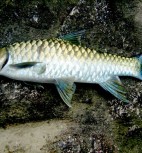
These are dozens of things going ghastly for the wildlife at the moment. Human interference in the form of city, town and rural community expansion with associated slaughter of agricultural, forest and other lands, along with contamination of waterways, all have an adverse effect on wildlife, be this in any form land or marine. Expansion in the population of Pakistan at frighteningly rapid rate and as the economic circumstances get worse for ordinary people who increasingly find it hard to make ends meet, so too does the stress on all forms of wildlife which already experience very badly from climate change and related issues.
But it’s even bad to quote that despite of all these facts, a very few people seem to care that this vast loss of ecosystems and their inhabitants will ultimately affect human life too.Here is an example; most people love eating freshly caught freshwater fish, yet give littl
e thought to where it actually comes from and whether or not it is fished in a sustainable way. In this respect, there are hunters who abide by the rules and regulations and there are fishermen who don’t. Plus, there are rising number of poachers who stealthily catch fish in vast numbers, by using fishing nets with very small network of wires meaning that they sweep up baby fish along with adults even though they are way too small to eat.
They also fish by dynamiting rivers and killing the whole thing else in the surrounding area too. This is extremely upsetting indeed, poisoning the rivers to kill the fish which will, quite obviously, contain traces of whatever poison was used to kill them with, when the fish is sold off to unsuspecting clientele in shops and, ultimately, ends on our menu table.
These illegal ways of catching fish result in a vast amount of ecological damage and have, especially in the case of one particular breed, ‘tor putitora’ or ‘’ as it is locally known. It is a ‘sporting’ fish, because professional anglers have a great, if difficult, time in catching them by legal means. It has been reduced from being relatively common in some rivers to being an endangered species now.
Consrvation has been initiated but not being carried own by the concerned authorities i.e. from local all the way up to government level are not particularly interested in the subject and as with so many other issues, will perhaps only pay concentration when it is too delayed.
It is true that there are wildlife warriors fighting on behalf of animals as endangered Mahseer fish remaining in the Poonch River of Azad Kashmir. But even this is hindered by the fact that contractors are hard at work, around the year, extracting gravel and pebbles from the river bed in areas where these fish like to raise and breed, so this exacting fish conservation program faces an enormously difficulty.
.